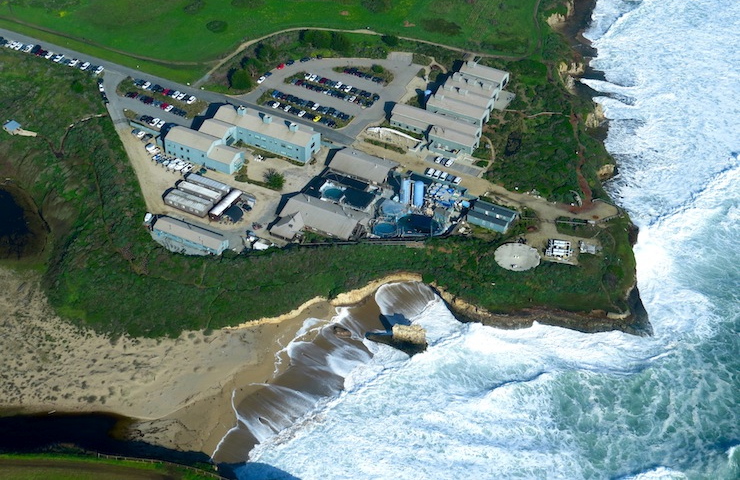Joseph M. Long Marine Laboratory
Joseph M. Long Marine Laboratory The Long Marine Laboratory (LML) was established as a coastal research facility overlooking Monterey Bay (and now the Monterey Bay National Marine Sanctuary) in 1978. It has since expanded to what is now designated as the UC Santa Cruz Coastal Science Campus. LML provides facilities to support research requiring running seawater, large marine mammal pools, seawater wet labs, SCUBA diving, boating, and fieldwork. The close proximity of the lab to the campus allows ease of integrating activities with the campus' instructional and research activities.
LML comprises four research buildings, six mobile trailers, a boatyard, 14 seawater pools, a tank farm, as well as office and seawater pool space in the California Department of Fish & Wildlife building on the Coastal Science Campus. The temperature-controlled pools include the largest (100-foot linear length) and deepest (30 feet max depth) saltwater research pool in the UC system, allowing for one atmosphere of pressure allowing for diving physiology research and SCUBA training experience.
LML is internationally recognized for innovative marine mammal research in diving physiology, physiological ecology, bioacoustics, and cognition. The Marine Lab also supports extensive fieldwork along the central coast and worldwide, involving field observation, tagging, and monitoring of marine mammals and birds. Innovative research into the biology, physiology and life strategies of fish and invertebrates, marine and coastal ecology, ocean acidification, and issues surrounding ocean health are also carried out.
Similarly, the Marine Mammal Physiology Lab and accompanying Comparative Neurophysiology Lab provide unique opportunities for scientists, undergraduate, and graduate student education, and research. The core facilities include trained marine mammals, 2.5 research staff positions, and facilities/seawater pool maintenance supported by grants to T.M. Williams through the Office of Naval Research marine mammal and DURIP programs. Access to the labs is scheduled weekly to include research project support and educational demonstrations for campus visitors, UCSC courses, and biology classes from Monterey region colleges and elementary and high school groups.
The predominant resources available to researchers utilizing LML are access to seawater and research space. Researchers appointed and affiliated with LML can utilize the services issued through the lab that include but are not limited to the following:
• 14 outdoor seawater pools, including two quarantine pools
• Outdoor tank farm for holding small invertebrates
• 1,000-gallon-per-minute seawater delivery system, wet and dry labs, and staff support
• Temperature-controlled seawater delivery system to the outdoor tank farm
• Seawater laboratories for fish, plankton, and marine invertebrates
• Culture lab for fish and marine invertebrate larvae and juveniles
• Controlled photoperiod labs
• Scientific diving instruction and certification program
• Small boat instruction and motorized boat certification program
• Diver locker, equipment, and Nitrox gas fill station
• Filtered seawater fill station
• Reverse Osmosis fill station
• Conference and classroom spaces
• Research lab space and multi-use lab space
• Wood Shop
• Machine Shop
• Volunteer opportunities for undergraduates with marine mammal and marine sciences programs
• Aquatic diving volunteer opportunities
• Access to federal/state research advisors within the NOAA Southwest Fisheries Science Center (SWFSC), California Department of Fish and Wildlife (CDFW), UCSC Natural Reserve System (NRS), and USGS Pacific Coastal and Marine Science Center (PCMS)
• Office, lab, and shared research working space access
• General administrative support (mail, delivery, space, communication, human resources, compliance)
• Facilities management (building maintenance and repair, research project support)
CONTACT: Ashley Vizurraga, Assistant Director Institute of Marine Sciences, LML Managing Director

